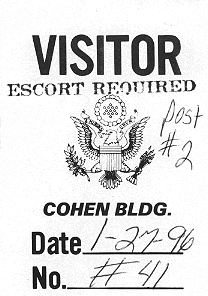


by J. Javid
New York
Somehow, the massive federal building on C Street, off Independence Avenue, did not look as daunting as the first time I entered it last spring to visit the Voice of America's Persian section.
I'm no expert in dating buildings. But I would not have been surprised if I saw a plaque somewhere giving the construction date sometime in the 1940s. The thick, dark stones framing the entrances felt way overconfident.
I hope you are not trying to read between the lines because I'm not trying to hide any messages about where the United States was 50 years ago and where it is today. But the building, quiet and virtually empty on that Saturday morning, did seem like a dinosaur. Once I thought it frightening, but now found it to be oddly charming almost to the point of being cute.
My friend, a VOA reporter, came down to the guarded entrance to pick me up. I signed in, got my entrance pass, and we were on our way. I was in Washington, D.C., for an Iranian short-films festival and thought it was a good opportunity to show around a printed copy of The Iranian.
Why a printed copy? Well, the VOA, or the Persian section at least, does not have access to the World Wide Web. The staff can send and receive e-mail -- in fact listeners in Iran often do e-mail their comments -- but that's about it. Every time I asked why, I was told about budget cuts.
As we walked into the Persian section, I saw some of the same people I had met before. I recognized their faces but not their names. For years in Iran, especially during the war with Iraq, I, like many other Iranians, would often listen to the VOA and associate a distinctive voice with a name. Now the faces were distracting me from recognizing the voices.
But I recognized Moloud Atefi, or Khanom (Lady or Ms.) Atefi as she is affectionately known to Iranians. Before the revolution, she read children's stories on Iranian national radio.
As far as I could tell, nearly everyone working in the Persian section used to work for Iranian radio or television before 1979. They seemed to get along well with each other. They often traded jokes and teased each other. You could feel a close bond. Was it their similar professional background? Their nationality? Their common fate?
When I was first introduced to Atefi last spring, I was with a friend who told her what good memories we have of listening to her warm voice. I remember her response exactly: "I'm proud to have raised such great children."
This time, she had a problem on her hand. She came over to her colleague asking for help. The photocopying machine was out of ink and she needed to copy things before she went on the air to read the news. Try the Arab or the Pashtou section, it was suggested. They might have a photocopier that works.
The typed news items had been laid and categorized on a round wooden table near the window at the end of a hallway about 20 meters long, with six or so cubicles on each side for each reporter. There was hardly any news about Iran itself.
There was one piece about a ruling against Abbas Maroufi, the novelist and editor of Gardoun, who was accused of insulting Iran's leader. The rest was from around the world; something about India testing a long-range missile and Hillary Clinton testifying to a panel investigating the Clintons' possible role in the Whitewater land fraud.
Shortly before the news was to be read, the printer jammed. A call was made to maintenance. Someone quickly came over and started playing with the network trying to get the printer going again. Instead a sign went up warning that the printer would be out until Monday afternoon -- two days away -- "at the earliest." Everyone had to change the command on their computer to print on the spare printer.
The news was read without a hitch. I heard it on a small internal radio box that looked as old as the VOA itself. It had a rotary dial next to the speaker which was used to tune into the desired channel. The sound was crisp and clear. None of the hisses and sudden ups and downs experienced on a shortwave radio in Iran.
I had nothing to do before I went to the film festival so I stuck around as long as I could. As I listened to the news, I stared at the walls. There were posters here and there of Iran from the late '60s or early '70s, probably printed by the tourism organization.
When my friend got back from reading the news, I was about to say goodbye when another
of his colleagues came over. "I sent a document to the wrong printer," he said. "I
can't delete the printing file either." They both looked each other. There was no
panic. Just, oh well. And an exchange of chuckles.